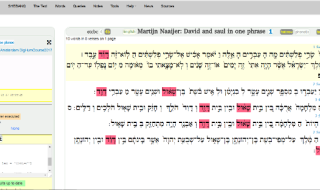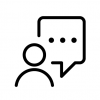"In order to do database analysis in a flexible way, you have to program.... so we developed our own course on programming in Python and R for master's and PhD students."
Even theologians learn to code with the help of Jupyter
The Vrije Universiteit's Eep Talstra Centre for Bible and Computer (ETCBC) has developed a database recording the complete grammar of the Hebrew Bible. To make good use of this database, you need programming knowledge. Few theologians have that.
Professor of the Old Testament Willem van Peursen and PhD student Martijn Naaijer therefore developed a special course, using SURF's JupyterHub.
What is the connection between theology and digitisation?
Van Peursen: "The digital method is one of the spearheads of Old Testament research at our Faculty of Theology. My predecessor at this chair, Eep Talstra, started building a database 40 years ago in which the complete text of the Hebrew Bible was recorded. Storage and analysis methods were of course limited at that time, but we could use computer programs to carry out analyses on the Bible texts. Talstra was a real pioneer in the late 1970s."
What can you research with a database of the Bible?
Naaijer: "The Hebrew Bible consists of several books, about which we actually know quite little. For us, an interesting question is how they originated. We try to say something about that using the grammar. In my research, I make use of the database started by Eep Talstra. The linguistic characteristics of each word are recorded, such as number, gender, phrase and verb tense, and in which verses the word occurs. For example, I have been working a lot on being-constructions. In Dutch, the linking verb 'zijn' (to be) is used for this, as in 'David is king'. In Hebrew, there are 5 different ways of saying that. Perhaps the form has to do with the writer's background."

Shebanq is a 'search engine' for querying the Bible database
"Trainees get access through SURF's JupyterHub service. It saves us a huge amount of time not having to install anything: just log in and get started."
Why do theologians need to learn programming?
Naaijer: "To be able to analyse the database in a flexible way, you need to be able to program. Most theologians do not know programming languages, so we have developed our own course on programming in Python and R for master's and PhD students. I teach the course using a Jupyter Notebook. In the environment, you can run code, include explanatory text and create visualisations of your data, such as bar charts. It is not a full Python course, it specifically focuses on the Bible database. Students are given assignments such as: find out how often a verb occupies the first place in the sentence in each book. That gets more and more complicated as the course progresses."
What are the students' experiences?
Naaijer: "The students get access via SURF's JupyterHub service. It saves us a huge amount of time not having to install anything: just log in and start. Although Python is known as a relatively easy programming language, it is still quite a study for them. But they find it interesting to be able to work with the database."

